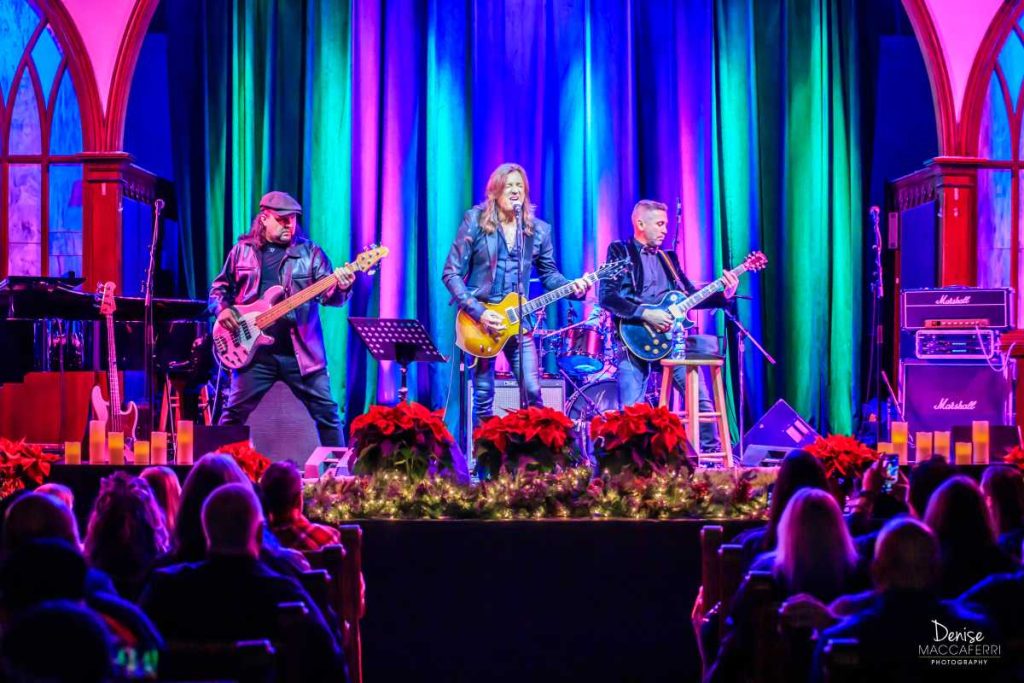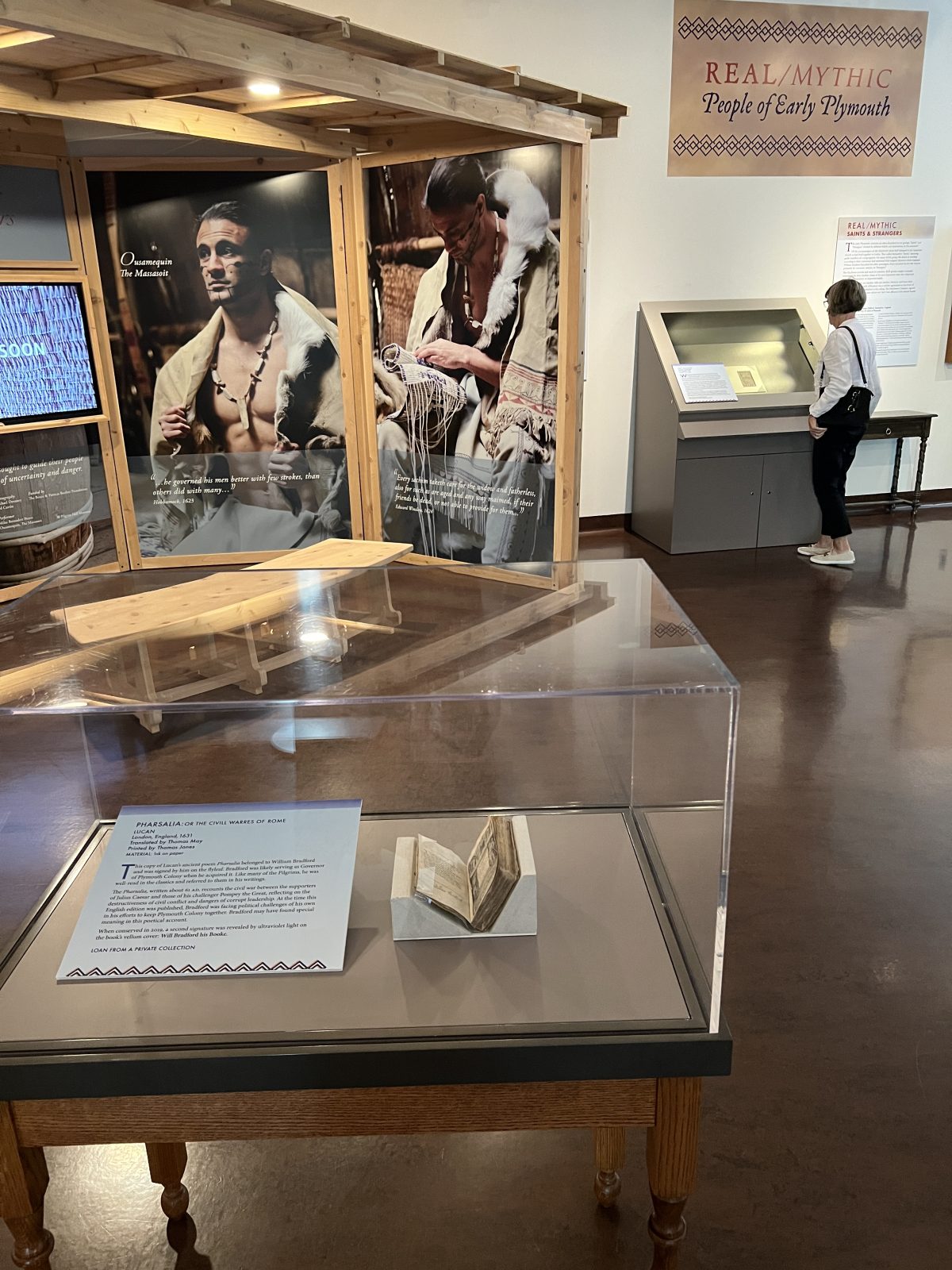This may be the week for a pilgrimage. Pilgrim Hall, the nation’s first public museum, has stories to tell about the Pilgrims and the region’s earlier inhabitants, the Wampanoag people who helped them survive that first hard year. The museum is currently showing a new exhibition entitled “Real/Mythic: People of Early Plymouth.” Originally planned for Plymouth’s 400th anniversary in 2020 – and postponed, like so many other specially planned events in that pandemic year – the exhibition “examines the lives and personal experiences of people who lived in early Plymouth,” the museum says.
Like its subjects, the English colonists who planted the first enduring European settlement in New England and the indigenous people who saw them as allies, Pilgrim Hall’s new exhibit survived the early challenge of pandemic closures to become a valuable source of information about the colony’s founders and the native people’s leaders and prominent figures.
The new exhibition at the downtown museum includes video portrayals of prominent figures by historical re-enactors, says Donna Curtin, its executive director. Historical re-enactors working from original source material also impersonated the two young women who were the wives of Habbamock, who lived for a year with the newcomers to help them adapt to a new land.
“We know the roles they played, but not their names,” Curtin says of Habbamock’s wives.
“Real/Mythic” highlights the significance of William Bradford, the colony’s long-term governor, and Massasoit Ousamequin, the Wampanoag leader who bonded with the new settlers during a time of dangerous uncertainty. It also includes the voices of English and Wampanoag women whose histories were long silenced, Curtin says, as well as video content produced by the Wampanoag owned production firm, SmokeSygnals. The Wampanoag participants “were working on their stories before the pandemic began,” she says.
The exhibition also includes material about the contributions of Pilgrim Edward Winslow who, while living in Holland did valuable research on what members of the Separatist colony would need to bring with them to survive in a new, wild environment, producing what amounted to “Cliff Notes” on establishing a thriving settlement, Curtin says. Winslow later kept a “quill book,” a kind of scrapbook of practical notes on what colony members did to survive in their new home.
Public interest in the both the historically “real” and now legendary first body of Europeans to settle in New England typically peaks around the holiday that remembers their contribution to our country’s beginnings, Curtin says. Pilgrim Hall’s exhibits also focus on William Bradford, the colony’s governor in its early years, and Wampanoag leader Ousamequin, “leaders during a time of dangerous uncertainty” according to the museum.
The exhibit also includes loaned art, including Karen Rinaldo’s painting “The First Thanksgiving,” a researched work depicting the surviving passengers of the Mayflower plus the 91 Wampanoag guests who attended what became known as the “First Thanksgiving” feast.
Other paintings include Annie Bissette’s “Dorothy Bradford Comes to America,” and “Eastern Leaders of the Dawn” by Mashpee Wampanoag artist Eleanor Jackson. Further, an early 20th century painting by English portrait artist Alfred Praga, titled “A Puritan Wooing,” depicts the romanticized story of the courtship of Priscilla Mullins and John Alden. The painting is being shown for the first time ever in North America.
Also on show are fragments of a 17th-century garment believed to have been owned by Priscilla Mullins Alden; and what’s called “The Brewster Book Manuscript,” containing early handwritten notes by Edward Winslow.
New works celebrating the town in its current incarnation are also on display. Two recently completed embroidered panels of what the museum calls “an epic needlework-in-the-making, ‘The Plymouth Tapestry,’” are now on show for the first time, Curtin says. The tapestry is the creation of Plymouth artist Elizabeth Creeden.
The museum is open this week on its regular schedule this week from Wed., Nov. 22, through Sun., Nov. 26, including Thanksgiving Day, from 9:30 a.m. to a last admission at 4:30 p.m. Pilgrim Hall operates on a Wednesday- through-Sunday schedule through Dec. 3. It then closes for the winter months until March. For admission fees see the website www.pilgrimhall.org. Located at 75 Court St., the museum is free to Plymouth residents.
Monday through Sunday, Nov. 20-26

Plimoth Patuxet Museums, a nexus of sites that “brings to life the history of Plymouth Colony and the Indigenous homeland” is also open this week. The former Plimoth Plantation offers a collection of major exhibits, including the Patuxet Homesite, the 17th-Century Pilgrim village, the Mayflower II, and Plimoth Grist Mill. These historical attractions are open from 9 a.m. to 5 p.m. every day this week, including Thanksgiving Day, but close for the season after Sunday, Nov. 26.
The sites can be visited separately or all together in a package deal. The replica Pilgrim or “English village” and the Patuxet Homesite are located at 137 Warren Ave. You can step aboard the Mayflower II on the waterfront. The Plimoth Grist Mill – where, as the museums’ description puts it, “you can gather kernels of history” – abuts Jenney Pond, off Summer Street.
The museums offer a range of ticket options. You can buy tickets for single sites or for all of them as a package. Visit www.plimoth.org for full information.
Plimoth Patuxet Museums offer a range of Thanksgiving dining options as well. Many of these tend to sell out well in advance of the day. Again, see the website.
The museums also offer daily showings of contemporary films at 4:30 and 7 p.m. indoors at 137 Warren Ave.
Thursday, Nov.23
Two other local traditions take place without fail on Thanksgiving Day.
Pilgrim Progress is a reenactment of the 17th century Pilgrims’ Sabbath Day procession to worship, beginning at the Mayflower Society House on 4 Winslow St., just off of North Street in downtown Plymouth. The progress replicates the procession to church made by the 51 surviving members of the Plymouth village after the first winter of 1620-21. Participants dress in 17th century period clothing.
Instituted in 1921 in honor of the town’s Pilgrim founders, the march takes place on the first four Fridays in August and on Thanksgiving Day, when it is regarded as an integral part of the town’s celebration of the day. The first written record of this custom was made by a visitor from the Dutch colony of New Netherlands who visited Plymouth in 1627 and wrote a detailed account which emphasizes – somewhat strangely to contemporary ears (or perhaps not) – the marchers’ attachment to their firearms. “They march in good order,” the account concludes, “and each sets his arms down near him. Thus they are constantly on their guard day and night.”
The line of march proceeds down to Plymouth Rock, up to Leyden Street, and then to Burial Hill, where a short service takes place on the site of the Pilgrims’ original meeting house. A brief passage from Governor Bradford’s history of the colony is read aloud. The participants then attend the service in the town’s First Parish Church.
If the Pilgrim Progress march honors the town’s Pilgrim forebears, the Day of Mourning demonstration, held every Thanksgiving on Coles Hill by the waterfront expresses is a kind of dissenting commentary on the theme of “thanksgiving.”
The event’s founders, the United American Indians of North America, describe the National Day of Mourning as “a solemn, spiritual and highly political day.” Many participants fast before taking part in the gathering, and break their fast together afterwards. The mourning, the sponsors say, is for “our ancestors and the genocide of our peoples and the theft of our lands.” While the accent is on mourning, the group states, “we also feel our strength in action and solidarity.”
The Day of Mourning begins at noon at Cole’s Hill. Rallies and marches through the town’s historic district will last until approximately 3 p.m. According to organizers this year’s event will be livestreamed from Plymouth.
The gathering’s purpose, the founders say, is to “dispel myths” surrounding the Thanksgiving story in the United States and raise awareness of the historical and ongoing struggles facing Native American tribes. The first Day of Mourning was held in 1970 after Frank “Wamsutta” James’s invitation to speak at a Massachusetts Thanksgiving Day celebration commemorating the 350th anniversary of Pilgrims’ landing was rescinded because his address was deemed too controversial. An Aquinnah Wampanoag elder who took the name Wamsutta after the son of Massasoit Ousamequin of the Pokanoket Tribe, the Indigenous leader who befriended and assisted the Pilgrim settlement, James delivered his speech beside the statue of Ousamequin on Cole’s Hill. The Day of Mourning continues to coincide both with America’s Thanksgiving Day and Unthanksgiving Day, an annual ceremony held on Alcatraz Island in California.
Other offerings this week include the following:
Monday, Nov. 20
Plymouth Public Library’s “Noteworthy Nonfiction Book Club” will meet from 6 to 7 p.m. at the library’s Nook Road Rooms. The group will be discussing “Elephant Company” by Vicki Croke. The book tells the story of an early 20th century British soldier’s relationship with the teak wood transporting elephants of Burma. Copies of the book are available at the circulation desk. For more information contact Kris Boyles at 508-830-4250 ext. 201.
Tuesday, Nov. 21
Plymouth G Pub, located at 101 Carver Road, offers free live comedy with Mike Murray & Friends in its taproom from 7 to 8 p.m. For more information about events at the restaurant, visit www.gpubrestaurants.com/plymouth/events/
Wednesday, Nov. 22
Plimoth Patuxet Museums are hosting a New England Harvest Feast and “An evening of entertainment and hospitality,” beginning at 5:30 p.m. on site at 137 Warren Ave. Along with a 17th century style meal, diners will be entertained with centuries-old psalms and songs. For costs and reservations, visit www.plimoth.org.
Friday, Nov. 24
Acclaimed bestselling children’s book author and illustrator Jan Brett will launch her first national book tour in four years at Plimoth Patuxet Museums, 137 Warren Ave., from 2:30 to 3:30 p.m. The author of more than 40 books, with 44 million copies in print, Brett will give a 20 to 30-minute drawing demonstration and presentation before a book signing. Visit www.plimoth.org for ticket information.
Saturday, Nov. 25

The Michael Sweet Band will perform a Christmas show at the Spire Center for the Performing Arts, located at 25 ½ Court St., from 8 to 10 p.m. Sweet is a songwriter who got his start by fronting a popular band on MTV. Tickets run from $35 to $100 and are available through the center’s website, www.spirecenter.org.
Sunday Nov. 26
Edaville Railroad offers its Santa Express on weekends, with trains departing at 12:45 p.m. from the theme park’s site at 5 Pine St. in Carver. Santa and Mrs. Claus will greet each child with a Christmas gift. Tickets are $69.95; children age 2 and under are free. Purchase tickets at www.edaville.com.
Monday, Nov. 27

James Montgomery, renowned singer, blues harp player, and leader of the James Montgomery Blues Band will perform at The Spire Center, 25 ½ Court St., from 7 to 9 p.m. Tickets are $34. For tickets, visit www.spirecenter.org.
Tuesday, Nov. 28
The Plymouth Public Library Chess Club welcomes chess players of all levels to its gatherings from 6 to 8 p.m. in the main library at 132 South St. Matches take place in the Nook Road study room areas. Experienced chess instructor Bill Petrillo and volunteer Jim Pritchard provide guidance to beginners.
Also on Tuesday, Plymouth G Pub, located at 101 Carver Road, offers free comedy with comedian Mike Murray & Friends in the taproom, beginning at 7 p.m.
Wednesday, Nov. 29
Inspired by Benjamin Franklin’s Junto club, the Plymouth Library’s Philosophy Group takes on a different philosophical question each week from 6 to 8 p.m. in the library’s craft room. The group’s aims are self-improvement and world betterment. Discussions are casual, with no judgments made.
Thursday, Nov. 30
Plymouth Public Library offers an online talk by award-winning author Naomi Alderman at 4 p.m. Participants are invited to take part in a discussion of her new book, “The Future.” Alderman is the author of “The Power,” called one of the best books of the year 2017 by the New York Times, the Washington Post and former president Barack Obama. In her new book, a group of friends try to stop a takeover by tech giants. Register with the library by calling 508-830-4250 to participate in the discussion.
The League of Women Voters is sponsoring “an evening” with Plymouth town manager Derek Brindisi, from 7 to 8 p.m. in the Great Hall at Town Hall. Brindisi is expected to talk about what town government is doing, as well as the challenges facing Plymouth. The public is invited to come listen and to ask questions. Afterward, the league will host a social in the same room.
To submit an item for the Culture Calendar, email Robert Knox at rc.knox2@gmail.com.

